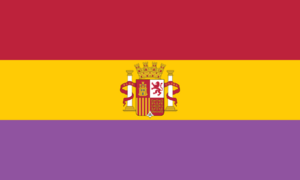Spanish Republican government in Exile facts for kids
The Spanish Republican government in Exile was a group of politicians who left Spain and lived in other countries, mainly France. They went into exile after the Spanish Civil War ended in 1939. At that time, a dictator named Francisco Franco took control of Spain. These politicians wanted to keep the government of the Second Spanish Republic alive, even though they were not in Spain.
They hoped that democracy would return to Spain after World War II. However, Franco continued to rule Spain for many more years. He stayed in power for over 35 years, until his death in 1975.
After Franco died, King Juan Carlos became the new leader of Spain. He helped bring back democratic government. In 1977, the exiled Republicans decided to accept King Juan Carlos as the new king. The king then allowed these politicians to come back home to Spain. This marked the end of the Spanish Republican government in Exile.
Contents
What Was the Spanish Republican Government in Exile?
The Spanish Republican government in Exile was like a shadow government. It was made up of leaders who had to leave Spain when Franco's forces won the Civil War. They believed they were still the rightful government of Spain. They wanted to keep the ideas of the Second Spanish Republic alive. This republic was a democratic government that ruled Spain before the war.
Why Did They Go Into Exile?
The Spanish Civil War lasted from 1936 to 1939. It was a fight between two main sides: the Republicans and the Nationalists. The Republicans supported the elected government. The Nationalists, led by General Francisco Franco, wanted a different kind of government. When Franco's side won, many people who supported the Republic had to leave Spain. They feared for their safety under Franco's rule.
Life in Exile
Many of these exiled politicians and their families went to France. They tried to continue their work from there. They held meetings and tried to get support from other countries. They hoped that countries like the United States and Great Britain would help them bring democracy back to Spain.
Hopes After World War II
When World War II ended in 1945, many people thought Franco's rule would also end. The Allied powers, who won World War II, had fought against dictatorships. They had defeated leaders like Adolf Hitler and Benito Mussolini. The exiled Republicans hoped these powerful countries would help remove Franco from power in Spain.
Why Franco Stayed in Power
However, things did not go as the exiles hoped. The world was changing, and a new conflict called the Cold War began. This was a struggle between the United States and the Soviet Union. Franco was strongly against communism, which was the system of the Soviet Union. Because of this, some Western countries saw Franco as an ally against communism. They did not push for him to leave power.
The Long Wait for Democracy
So, Franco continued to rule Spain for many more decades. The exiled government kept hoping, but their chances of returning to power grew smaller over time. Many of the original leaders grew old or passed away while still in exile.
The Return to Democracy in Spain
In 1975, General Francisco Franco died. This was a major turning point for Spain. After his death, King Juan Carlos became the head of state. King Juan Carlos had been chosen by Franco to be his successor. However, the King surprised many people by working to bring democracy back to Spain.
The End of the Exile Government
As Spain moved towards democracy, the exiled Republican government had a big decision to make. In 1977, they decided to accept King Juan Carlos and his efforts to create a democratic Spain. This was a very important moment. It meant they were giving up their claim to be the official government.
Coming Home
After this decision, King Juan Carlos allowed the exiled politicians to return to Spain. Many of them had not been home for nearly 40 years. Their return marked the official end of the Spanish Republican government in Exile. It was a peaceful end to a long and difficult period for these leaders and their families.
See also
In Spanish: Segunda República española en el exilio para niños


